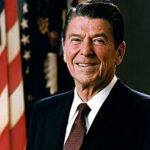President Reagan’s acceleration of trucking deregulation built upon Jimmy Carter’s Motor Carrier Act of 1980. This landmark policy dismantled decades of Interstate Commerce Commission control over the trucking industry. Reagan removed price controls and eliminated barriers that prevented new companies from entering the market.
The Deregulation Framework
The policy eliminated the ICC’s authority to set trucking rates and routes. Companies could now operate wherever market demand existed. New trucking firms no longer needed government approval to start operations. This created immediate competition among thousands of carriers nationwide.
Market-Based Solutions
Reagan’s approach demonstrated the power of free-market principles over government regulation 📊. The administration believed competition would naturally drive down costs and improve service quality. This trucking deregulation became a model for other transportation sectors. The policy aligned perfectly with Reagan’s broader economic philosophy of reducing federal oversight 💰.
Impact:
The effects of trucking deregulation transformed American commerce and validated Reagan’s free-market approach. Shipping costs dropped dramatically by 25-35% within the first few years of implementation. This reduction benefited consumers through lower prices on goods transported by truck across the nation.
Economic Benefits and Competition
Thousands of new trucking companies entered the market, creating unprecedented competition 📈. Small businesses gained access to affordable shipping options previously unavailable under ICC regulation. Manufacturing companies reduced their transportation expenses, improving profit margins and competitiveness. The policy generated billions in consumer savings annually across all economic sectors 💰.
Long-term Industry Transformation
Trucking deregulation revolutionized supply chain management and logistics operations. Companies developed more efficient delivery systems and specialized services for specific industries. The policy contributed significantly to America’s economic growth during the 1980s recovery period. Historians widely praise this decision as one of Reagan’s most successful domestic policy achievements ⚠️. The deregulation model influenced transportation policy reforms worldwide, cementing Reagan’s legacy in economic policy.
